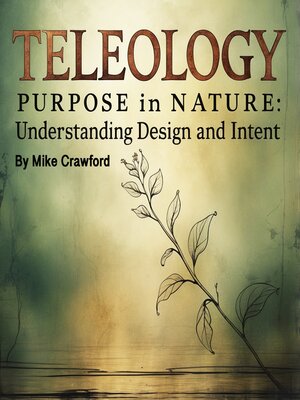Teleology
audiobook (Unabridged) ∣ Purpose in Nature: Understanding Design and Intent
By Mike Crawford

Sign up to save your library
With an OverDrive account, you can save your favorite libraries for at-a-glance information about availability. Find out more about OverDrive accounts.
Find this title in Libby, the library reading app by OverDrive.



Search for a digital library with this title
Title found at these libraries:
| Library Name | Distance |
|---|---|
| Loading... |
Teleology is the study of purpose, design, and goal-directedness in nature. It is a concept that has shaped philosophical, scientific, and theological discourse for centuries, offering explanations for why things exist and function the way they do. The term itself comes from the Greek word telos, meaning "end" or "goal," and logos, meaning "study" or "reason." At its core, teleology seeks to explain natural phenomena by considering their intended purpose or final cause rather than merely their material composition or mechanical processes. This perspective has been a fundamental part of human thought, influencing fields as diverse as biology, ethics, cosmology, and psychology.
The significance of teleology lies in its ability to provide a framework for understanding the apparent order and directionality in the world. From the intricate adaptations of biological organisms to the finely tuned laws of the universe, teleological reasoning has historically been used to argue for the presence of intentionality or inherent purpose in natural systems. Philosophers such as Aristotle, who introduced the concept of final causes, and later thinkers like Thomas Aquinas, who integrated teleology into theological arguments, viewed the natural world as inherently purposeful. Even in modern times, teleological thinking persists in various scientific discussions, particularly in debates surrounding evolution, complexity, and emergent phenomena.







